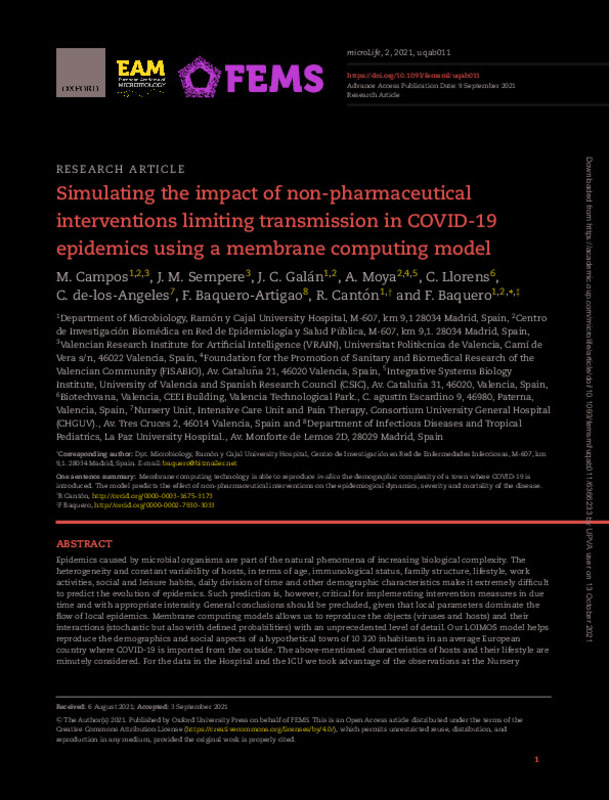JavaScript is disabled for your browser. Some features of this site may not work without it.
Buscar en RiuNet
Listar
Mi cuenta
Estadísticas
Ayuda RiuNet
Admin. UPV
Simulating the impact of non-pharmaceutical interventions limiting transmission in COVID-19 epidemics using a membrane computing model
Mostrar el registro sencillo del ítem
Ficheros en el ítem
| dc.contributor.author | Campos Frances, Marcelino
|
es_ES |
| dc.contributor.author | Sempere Luna, José María
|
es_ES |
| dc.contributor.author | Galán, J. C.
|
es_ES |
| dc.contributor.author | Moya, A.
|
es_ES |
| dc.contributor.author | Llorens, C.
|
es_ES |
| dc.contributor.author | de-los-Angeles, C.
|
es_ES |
| dc.contributor.author | Baquero-Artigao, F.
|
es_ES |
| dc.contributor.author | Cantón, R.
|
es_ES |
| dc.contributor.author | Baquero, F.
|
es_ES |
| dc.date.accessioned | 2022-10-19T18:04:21Z | |
| dc.date.available | 2022-10-19T18:04:21Z | |
| dc.date.issued | 2021-09-09 | es_ES |
| dc.identifier.uri | http://hdl.handle.net/10251/188310 | |
| dc.description.abstract | [EN] Epidemics caused by microbial organisms are part of the natural phenomena of increasing biological complexity. The heterogeneity and constant variability of hosts, in terms of age, immunological status, family structure, lifestyle, work activities, social and leisure habits, daily division of time and other demographic characteristics make it extremely difficult to predict the evolution of epidemics. Such prediction is, however, critical for implementing intervention measures in due time and with appropriate intensity. General conclusions should be precluded, given that local parameters dominate the flow of local epidemics. Membrane computing models allows us to reproduce the objects (viruses and hosts) and their interactions (stochastic but also with defined probabilities) with an unprecedented level of detail. Our LOIMOS model helps reproduce the demographics and social aspects of a hypothetical town of 10 320 inhabitants in an average European country where COVID-19 is imported from the outside. The above-mentioned characteristics of hosts and their lifestyle are minutely considered. For the data in the Hospital and the ICU we took advantage of the observations at the Nursery Intensive Care Unit of the Consortium University General Hospital, Valencia, Spain (included as author). The dynamics of the epidemics are reproduced and include the effects on viral transmission of innate and acquired immunity at various ages. The model predicts the consequences of delaying the adoption of non-pharmaceutical interventions (between 15 and 45 days after the first reported cases) and the effect of those interventions on infection and mortality rates (reducing transmission by 20, 50 and 80%) in immunological response groups. The lockdown for the elderly population as a single intervention appears to be effective. This modeling exercise exemplifies the application of membrane computing for designing appropriate multilateral interventions in epidemic situations. | es_ES |
| dc.description.sponsorship | MC and FB were sponsored by the Projects COV20 00067 of the Program SARS-COV-2 and COVID-19 infection of the Instituto de Salud Carlos III, Ministerio de Ciencia e Innovacion of Spain, CB06/02/0053 of the Centro de Investigacion Biom edica en Red de Epidemiolog¿a y Salud Publica (CIBERESP), and the Regional Government of Madrid (InGeMICS-B2017/BMD-3691). For JCG, this study was partially founded by the Autonomous Community of Madrid, Spain (COVID-19 Grant, 2020) and the Ramon y Cajal Institute for Health Research (IRYCIS), Madrid, Spain. For AM, this study was supported by grants from the Spanish Ministry of Science and Innovation (PID2019-105969GB-I00), the government of Valencia (project Prometeo/2018/A/133) and cofinanced by the European Regional Development Fund (ERDF). | es_ES |
| dc.language | Inglés | es_ES |
| dc.publisher | Oxford University Press | es_ES |
| dc.relation.ispartof | microLife | es_ES |
| dc.rights | Reconocimiento (by) | es_ES |
| dc.subject | COVID-19 | es_ES |
| dc.subject | Interventions | es_ES |
| dc.subject | Membrane computing | es_ES |
| dc.subject | Modeling | es_ES |
| dc.subject.classification | LENGUAJES Y SISTEMAS INFORMATICOS | es_ES |
| dc.title | Simulating the impact of non-pharmaceutical interventions limiting transmission in COVID-19 epidemics using a membrane computing model | es_ES |
| dc.type | Artículo | es_ES |
| dc.identifier.doi | 10.1093/femsml/uqab011 | es_ES |
| dc.relation.projectID | info:eu-repo/grantAgreement/AEI/Plan Estatal de Investigación Científica y Técnica y de Innovación 2017-2020/PID2019-105969GB-I00/ES/CAMBIOS CON LA EDAD DE LAS INTERACCIONES DE LA MICROBIOTA CON SU HOSPEDADOR HUMANO Y DETERMINACION DE UN NUCLEO PERMANENTE DE SIMBIONTES MUTUALISTAS/ | es_ES |
| dc.relation.projectID | info:eu-repo/grantAgreement/GVA//PROMETEO%2F2018%2FA%2F133/ | es_ES |
| dc.relation.projectID | info:eu-repo/grantAgreement/MCIU//CB06%2F02%2F0053/ | es_ES |
| dc.relation.projectID | info:eu-repo/grantAgreement/CAM//S2017%2FBMD-3691/ | es_ES |
| dc.rights.accessRights | Abierto | es_ES |
| dc.contributor.affiliation | Universitat Politècnica de València. Departamento de Sistemas Informáticos y Computación - Departament de Sistemes Informàtics i Computació | es_ES |
| dc.description.bibliographicCitation | Campos Frances, M.; Sempere Luna, JM.; Galán, JC.; Moya, A.; Llorens, C.; De-Los-Angeles, C.; Baquero-Artigao, F.... (2021). Simulating the impact of non-pharmaceutical interventions limiting transmission in COVID-19 epidemics using a membrane computing model. microLife. 2:1-14. https://doi.org/10.1093/femsml/uqab011 | es_ES |
| dc.description.accrualMethod | S | es_ES |
| dc.relation.publisherversion | https://doi.org/10.1093/femsml/uqab011 | es_ES |
| dc.description.upvformatpinicio | 1 | es_ES |
| dc.description.upvformatpfin | 14 | es_ES |
| dc.type.version | info:eu-repo/semantics/publishedVersion | es_ES |
| dc.description.volume | 2 | es_ES |
| dc.identifier.eissn | 2633-6693 | es_ES |
| dc.identifier.pmid | 34642663 | es_ES |
| dc.identifier.pmcid | PMC8499911 | es_ES |
| dc.relation.pasarela | S\446391 | es_ES |
| dc.contributor.funder | Comunidad de Madrid | es_ES |
| dc.contributor.funder | Generalitat Valenciana | es_ES |
| dc.contributor.funder | Instituto de Salud Carlos III | es_ES |
| dc.contributor.funder | Agencia Estatal de Investigación | es_ES |
| dc.contributor.funder | European Regional Development Fund | es_ES |
| dc.contributor.funder | Ministerio de Ciencia, Innovación y Universidades | es_ES |
| dc.subject.ods | 03.- Garantizar una vida saludable y promover el bienestar para todos y todas en todas las edades | es_ES |








